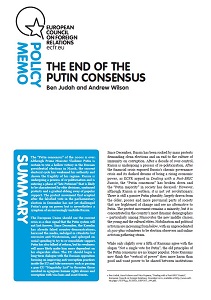THE END OF THE PUTIN CONSENSUS
THE END OF THE PUTIN CONSENSUS
Author(s): Ben Judah
Subject(s): Government/Political systems, International relations/trade
Published by: ECFR European Council on Foreign Relations
Keywords: EU and Russia; Vladimir Putin;
Summary/Abstract: The “Putin consensus” of the 2000s is over. Although Prime Minister Vladimir Putin is certain to win a hollow victory in the Russian presidential elections in March, the current electoral cycle has weakened his authority and shown the fragility of his regime. Russia is undergoing a process of re-politicisation and is entering a phase of “late Putinism” that is likely to be characterised by elite divisions, continued protests and a gradual ebbing away of popular support. The protest movement that erupted after the falsified vote in the parliamentary election in December has not yet challenged Putin’s grip on power but is nevertheless a symptom of an increasingly unstable Russia.
The European Union should see the current crisis as a clear signal that the Putin system will not last forever. Since December, the Kremlin has already faked counter-demonstrations, harassed the media, indulged in ritualistic but corrosive anti-Westernism, and splurged on social spending to try to re-consolidate support. Putin has also talked of reform, but his weakness will more likely make him more dependent on his oligarchic allies. The EU should begin a long-term dialogue with the Russian opposition focusing on improving anti-corruption practices inside the EU and take measures such as passing a pan-EU “Magnitsky List” to threaten those involved in egregious human rights abuses and corruption with visa bans and asset freezes.
Series: POLICY MEMO
- Page Count: 10
- Publication Year: 2012
- Language: English
- Content File-PDF

